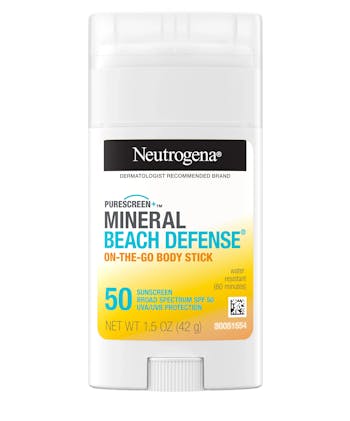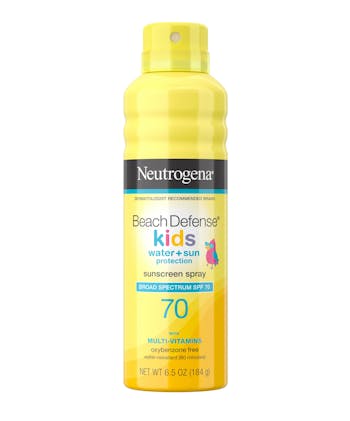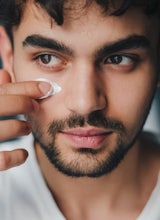Bathing suit, check. Sunglasses, check. Flip-flops, check. Now for the most important part: What's the best sunscreen for your beach vacation? Finding a sunscreen that fits in seamlessly with your daily activities, from hiking to snorkeling, is key to protecting your skin. So, think before you throw last summer's bottle into your suitcase and call it a day.
Ultraviolet (UV) damage doesn't stop when the fun starts. Plus, nobody wants to nurse a sunburn on vacation. So, dive into the wonderful world of sun protection to learn how to keep your whole family fully focused on fun. Because your memories should involve sparkling, blue water — not peeling, red skin.
All About SPF and Its Role in Sunscreen
Let's start with the numbers. SPF, or sun protection factor, tells you what level of protection your sunscreen provides against UVB rays. UVB rays affect the outermost layers of skin and cause sunburn and inflammation. UVA rays, on the other hand, penetrate the deeper layers of skin, causing long-term damage. Broad spectrum sunscreen protects against both types of rays.
You may have heard that SPF indicates the amount of time your skin is protected in the sun. For example, SPF 30 protects you from sunburn 30 times longer than if you weren't wearing any sun protection at all. But the U.S. Food and Drug Administration dispels this myth. SPF indicates the amount of protection a sunscreen offers, not the amount of time. So, SPF 50 provides more UVB protection than SPF 30. But it's important to consider other factors when choosing your SPF.
Choosing Your Magic Number
The time of day you're out in the sun affects the level of UV radiation you're exposed to. The sun's rays are strongest between 10 a.m. and 4 p.m. during daylight savings time. Always go for a sunscreen with at least SPF 30, but pack something higher if you'll be out and about during these peak hours.
Consider your skin tone, too. Fair skin is more susceptible to sunburn, so you're better off using a higher SPF if you fall into this category. For example, some research shows that sunscreen with SPF 30+ is sufficient for darker skin tones, whereas people with lighter skin may want to up the ante with SPF 50+ sunscreen.
Essential Ingredients in Effective Sunscreen
Sunscreen ingredients vary, and they make a difference when it comes to choosing the best sunscreen for your vacation. To start, there are two types of sunscreen ingredients: chemical and mineral. Chemical sunscreen ingredients — like avobenzone, oxybenzone, homosalate, octisalate and octocrylene — sink into the top layers of the skin and absorb UV rays before they can reach the deeper layers. Mineral sunscreen ingredients, like zinc oxide and titanium dioxide, physically sit on top of the skin to keep UV rays from penetrating. Both types of sunscreen protect you from sun damage, but some people prefer one over the other.
If you're gearing up for a day of swimming or snorkeling, check the location's guidelines for sunscreen use. Some beaches prohibit chemical sunscreen formulas. If you aren't able to find the information you need ahead of time, pack a mineral sunscreen just in case.
Ingredients To Avoid
You may want to avoid certain ingredients if you have sensitive skin, eczema or other concerns. For example, synthetic fragrance ingredients may be linked to allergic reactions and skin sensitivity. If you have sensitive skin, consider avoiding sunscreen with "fragrance" or "perfume" at the top of the ingredients list.
Why Water-Resistant Sunscreen Matters
This might go without saying, but one of the most important properties of a beach vacation sunscreen is water resistance. Pool water, salt water and sweat all cause sunscreen to break down more quickly than it otherwise would, leaving your skin vulnerable to sun damage. Water-resistant sunscreen is designed to stand up to sweating and swimming to keep you protected on those active days.
No sunscreen is totally waterproof. Water-resistant sunscreens offer either 40 or 80 minutes of protection, so check the label and remember to reapply accordingly or after toweling off.
The Best Sunscreens for Your Beach Vacation
Stick
Try Neutrogena® Purescreen+® Mineral Beach Defense® On-The-Go Body Stick Sunscreen SPF 50 for a convenient sunscreen stick that glides on effortlessly. This 100% mineral active formula is perfect for a no-mess application, making it great for quick touch-ups when you're on the go. It also offers broad spectrum SPF 50 protection for the whole family and is suitable for all skin types, including sensitive skin.
Kid's Spray
Made for kids' skin, Neutrogena® Beach Defense® Kids Sunscreen Spray Broad Spectrum SPF 70 with Multi-Vitamins provides fierce sun and water protection in a fast-drying, lightweight formula with antioxidant multivitamins C and E. It's vegan, suitable for all skin types, and free of dyes, parabens and oxybenzone.
Lotion
Go classic with Neutrogena® Beach Defense® Water + Sun Protection Oxybenzone-Free Sunscreen Lotion Broad Spectrum SPF 70. This formula is super absorbent and offers 80 minutes of water resistance to stand up to the strongest swimmers.
Incorporating Sunscreen Into Your Daily Skincare Routine
All sun exposure adds up to premature skin aging and other skin issues over time, so daily sun protection is essential. You'll likely spend a significant amount of time in the sun on your beach vacation. Still, rainy days always seem to sneak their way in. Don't skip sunscreen on these days — even when you plan to be indoors. The sun's rays can reach your skin through clouds and car windows, and breaking the habit can increase the odds that you forget when it's critical.
When selecting your daily sunscreen, opt for a product made for your skin type. For example, try something oil-free if you have oily skin or acne, or go for a moisturizing sunscreen if you're on the drier side.
Sunscreen Application Tips To Maximize Effectiveness
Applying sunscreen before you head out the door in the morning is only one part of an effective sun protection plan. Be sure to apply enough sunscreen to cover all areas of exposed skin, and reapply at least every two hours or after swimming, sweating or toweling off. The American Academy of Dermatology recommends 1 full ounce for adults. Finally, remember those often overlooked areas, like the ears, back of the neck and tops of the feet.
Staying Sun-Safe at the Beach
While daily sun protection is essential no matter where you are, considering your environment can help you choose the best sunscreen for your beach vacation. As you prepare for your ocean getaway, pack a mineral sunscreen with an SPF of over 30, and choose a stick or spray formula for easy application. Cover all your bases so you can focus on the fun!
FAQ
What is the best sunscreen for sensitive skin?
Mineral sunscreens and sunscreen formulas without synthetic fragrances or alcohol may be gentler on sensitive skin.
What does "reef-safe" sunscreen mean?
This is an unregulated term that refers to sunscreen made with mineral sunscreen ingredients, like zinc oxide, and without chemical sunscreen ingredients.
Can you wear sunscreen under makeup?
Wearing sunscreen under makeup is important to maintain healthy, protected skin. Choose an oil-free formula to avoid clogging pores.
How often should you apply sunscreen at the beach?
Apply sunscreen every two hours and after swimming, sweating or toweling off.











